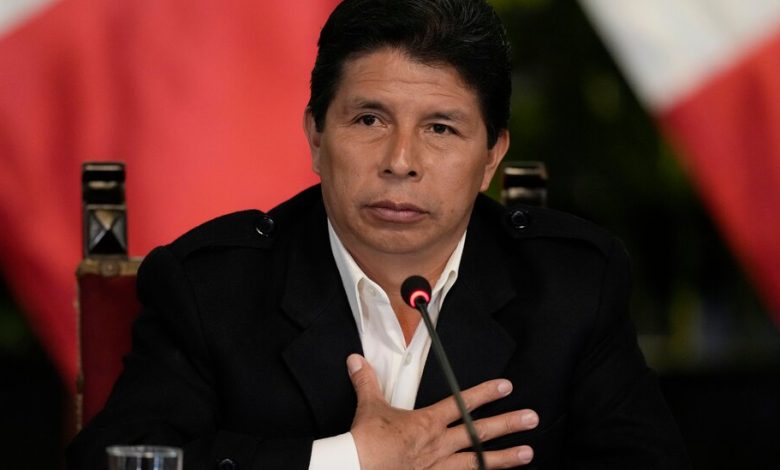Peru’s President, Facing Impeachment, Says He Will Dissolve Congress

LIMA — Peru’s president on Wednesday announced the dissolution of Congress and the installation of an emergency government to rule by decree, ahead of a scheduled vote to impeach him to be held by Congress.
In a public address, President Pedro Castillo imposed an immediate national curfew and called for all citizens to turn in their firearms — a move that political leaders across the spectrum and constitutional experts were quick to denounce as a coup attempt.
“We have taken the decision to establish a government of exception, to reestablish the rule of law and democracy to which effect the following measures are dictated: to dissolve Congress temporarily, to install a government of exceptional emergency, to call to the shortest term possible to elections for a new Congress with the ability to draft a new Constitution,” Mr. Castillo said.
Mr. Castillo’s stunning declaration plunged the fragile democracy into its biggest political crisis in years.
The announcement echoed a move by President Alberto Fujimori, who was elected democratically in 1990 and then two years later staged a coup with the support of the military and ruled as a dictator until 2000.
Omar Cairo, a constitutional lawyer who considered the impeachment vote illegal and has been sympathetic to Mr. Castillo’s position, said, “Congress is still contemptible, but what Castillo has done is a manifest coup d’état.”
On Wednesday, Congress was scheduled to vote on a motion to impeach the president, the third such attempt, which would have led to his immediate removal from office.
Last month, the Peruvian leader threatened to dissolve Congress using a contentious constitutional maneuver and local media outlets recently reported that he tried to survey military leaders about supporting such a move.
Since the beginning of his tenure, Mr. Castillo has been plagued by high-level corruption scandals, criminal investigations and cabinet turnover. Prosecutors have accused him of leading a criminal organization with lawmakers and family members to profit off government contracts, and of repeatedly obstructing justice.
Peru has already been hobbled by years of high-level corruption scandals resulting in five presidents since 2016. Mr. Castillo’s tenure has only deepened the sense that the country’s political system is broken.
Since taking office, he has churned through more than 80 ministers and filled many posts with political allies lacking relevant experience, some of whom have faced investigations for corruption, domestic violence and murder.
After Mr. Castillo’s defense minister resigned on Saturday, citing personal reasons, rumors of a military coup — in favor and against Mr. Castillo — went viral on social media, leading some opposition lawmakers to stay the night in Congress on Sunday for fear of a violent attempt by armed forces to close the chamber. No such attempt was made.
On Tuesday, the head of Peru’s army submitted his resignation, citing personal reasons, in a letter made public on Wednesday.
Mr. Castillo, a former farmer, schoolteacher and union activist with no previous governing experience, narrowly defeated Keiko Fujimori, a career right-wing politician, in last year’s election after campaigning to support poor Peruvians who had been left behind by the country’s economic expansion this century.
His victory reflected the growing disillusionment in Peru of an elite political class that has been tainted by years of back-to-back graft scandals and infighting. Two of Mr. Castillo’s predecessors faced two impeachment motions each, and both considered them unlawful.
Former President Martín Vizcarra, the only Peruvian leader to be successfully ousted before Mr. Castillo, left office after the vote in 2020, but filed an appeal before the Constitutional Tribunal, which declined to weigh in on its legality.
In a televised message to the nation late on Tuesday, Mr. Castillo said the impeachment motion was part of the same bid to keep him from governing that has dogged him since his victory over Ms. Fujimori, who led a weekslong campaign to overturn the election results based on unfounded claims of fraud.
“Throughout the 17 months of my administration, a certain sector of Congress has focused solely on removing me from office, because they never accepted the results of an election that you, dear Peruvians, defined with your votes,” said Mr. Castillo.
“I’m not corrupt,” he added. “I’m honest. I’m a man from the countryside who has been paying the mistakes for his inexperience but who has never committed a crime.”
However, Mr. Castillo has not responded publicly to the prosecutors’ investigations or to any of the multiple accusations made by former members of his inner circle, who accuse him of taking bribes in exchange for granting contracts and appointing allies to key posts.
This week, his former intelligence chief of more than a year publicly accused him of giving the order for his now fugitive former transportation minister to flee an arrest warrant, and said Mr. Castillo was uninterested in his reports of purported corruption by key advisers and family members.
“He remained mute,” the former official, Jose Latorre, said in a televised interview.
